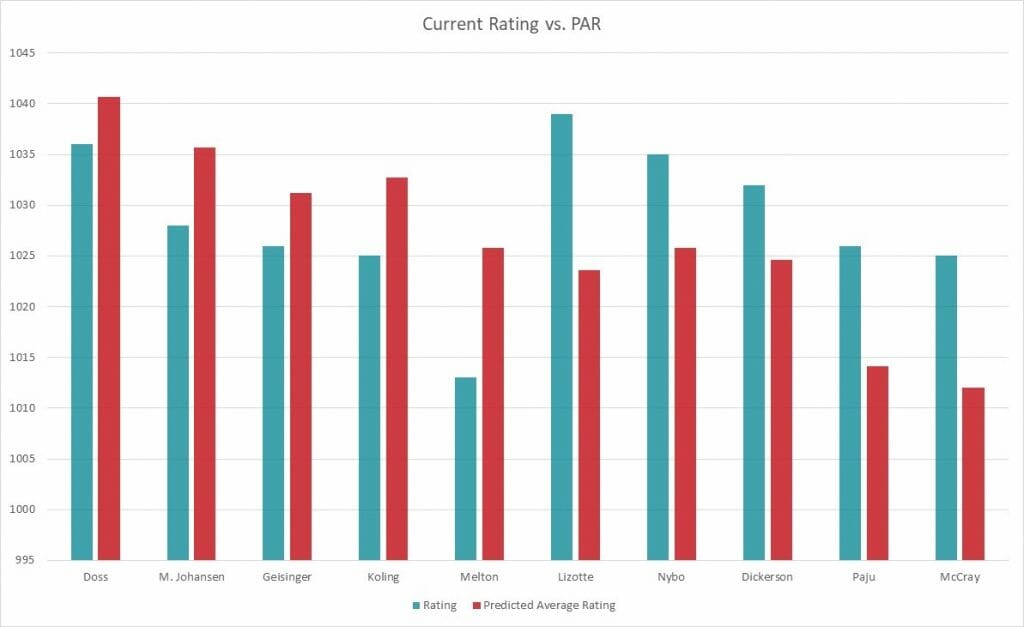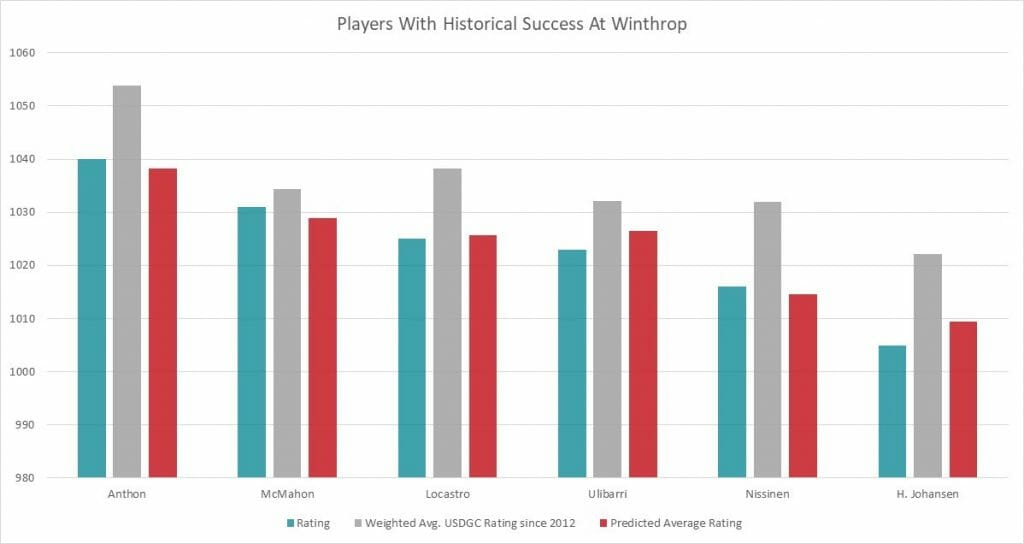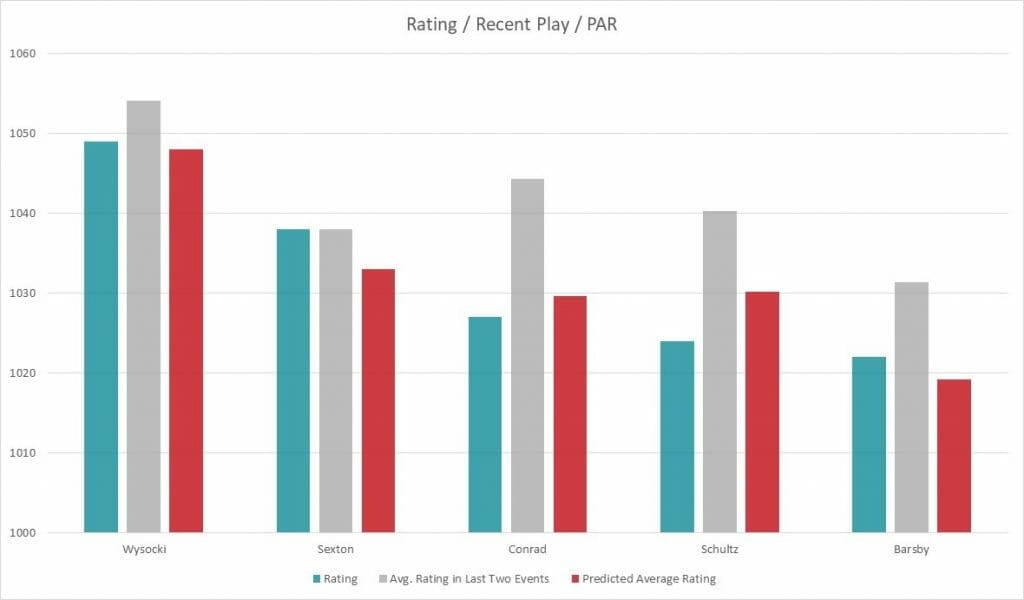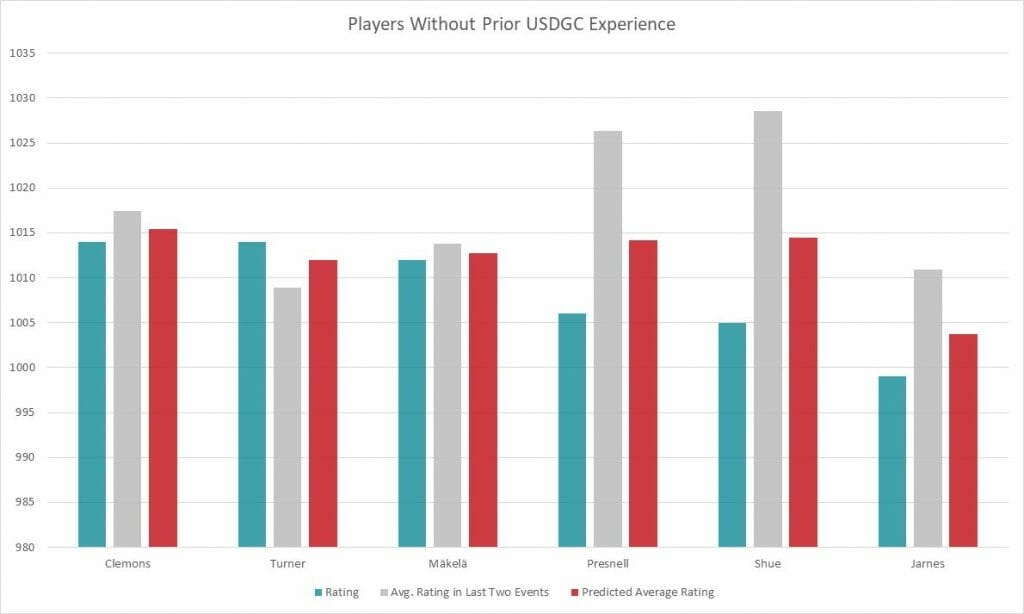Ultiworld Disc Golf’s coverage of the 2017 United States Disc Golf Championship is presented by Savage Apparel Co.; all opinions are those of the authors. Please support the brands that make Ultiworld Disc Golf possible and shop at Savage!
One tenet holds true at every level of disc golf: If you play above your rating, on average, you will place higher. As a result, player performance can often be judged by comparing average ratings in an event to a player’s current rating, and one of the underrated elements in following along with the United States Disc Golf Championship – or any high-level professional tournament, really – is seeing which players outperform their expectations and rise to the top. Predicting who those players might be, though, is another matter, as performance can widely vary.
In a general sense, at least three variables can be used to assess how well a player might perform in a given tournament:
- Current rating
- Past performance at tournament/course
- Performance in recent weeks
Using a weighted average formula – one that we tested during the Vibram Open and adjusted slightly for the USDGC – we produced a Predicted Average Rating (PAR) for a number of the more highly rated players in the event. Here’s the recipe:
- Current player rating: 25%
- Weighted average for USDGC rounds at Winthrop Gold since 2012: 35% (( The weighted average USDGC ratings for rounds at Winthrop Gold since 2012 were weighted on a scale so that more recent rounds were given greater weight.))
- Average rating for the last two events played: 40%
- Each of the three variables were weighted according to their assigned percentage and added together, producing a PAR
Some Up, Some Down
Some players have both performed well at recent USDGCs and in their most recent events, others not so much. As a result, it looks like a few players in the field are well-positioned to outperform their current rating, while others might have some difficulty averaging theirs this week. The players on the below chart ended up with some of the highest and lowest PARs and cover both ends of the spectrum when comparing their current rating to their PAR.A few quick takeaways:
Michael Johansen is someone we usually associate with strong play at wooded courses, where accuracy is paramount, but Winthrop Gold demands just as much of that. Thus, it’s no surprise he’s projected to play well compared to his current rating, since he has a 1034 weighted average rating in rounds at Winthrop Gold since 2012 and comes into the event with a 1042 average rating over his last two events. He has a track record of quality USDGC finishes and looks poised to do it again this year.
Zach Melton has played quite well at Winthrop Gold during the last two USDGCs, with a weighted average rating of 1028, and he’s had a great last two events, with an average rating of 1032 in those. He’s a player whose current player rating (1013) seems to mean very little in terms of how he might perform, as he’s playing well heading into an event where he’s finished 13th and 10th in prior runs.
Simon Lizotte is undoubtedly one of the most talented throwers in the game, but he hasn’t had the combination of past success at Winthrop Gold and a run of recent success to suggest he might average somewhere near his very high rating. There’s always a chance his new bag—he gave away his previous one after the Green Mountain Championship—makes up the difference.
Strong USDGCs Since 2012, Question Marks Elsewhere
There are a handful of competitors who have handled Winthrop Gold with relative ease, but enter this year’s tournament on the heels of some spotty performances. As a result, their PAR, in general, remains relatively close to their current ratings. We’ll have to see if their past USDGC success ultimately makes the difference.Josh Anthon’s numbers here could easily have an asterisk, simply because it’s been awhile since he’s played Winthrop. He finished third in 2012 and thus carries with him a high average rating at 1054. He’s definitely capable of averaging 1054 again, and he did better than that while winning the Ledgestone Insurance Open earlier this year a similarly styled course. His 1024 average rating over his most recent two events might temper expectations a bit, though.
Nikko Locastro is no stranger to USDGC success. He won in 2009 and has navigated the course well since, posting a 1038 weighted average rating there since 2012. Plus, he finished second last year. Locastro hasn’t been flying quite as high lately, though, with only one top 10 finish since the beginning of August and a 1015 average rating over his last two events.
Paul Ulibarri was in great form throughout much of the summer, not finishing outside the top 10 in any event between Pro Worlds and the Pittsburgh Flying Disc Open. If not for a slip up at the Vibram Open he likely would have featured on the first chart, and he rebounded for another top 10 at the GMC. He’s played Winthrop Gold well in recent years with a 1032 weighted average rating and could use that experience to finish 2017 strong.
Who Has Played Well Lately?
Some players have exceeded their current ratings in recent events and, in some cases, those performances also exceed how well they’ve played at the USDGC. Other players’ hot streaks have been enough to lift up their PAR and negate some less than stellar showings in Rock Hill.James Conrad has been one of the hottest players on tour all season, and that was the case for the PFDO and Vibram Open, where he notched a 1044 average rating. Though he lacks experience at Winthrop – last season was his first go-round – he provides plenty of upside: Conrad improved during each of the three rounds in 2016, finishing with a 1030-rated final frame. He’s absolutely playing better golf then he was this time last year, and with the added experience at Winthrop Gold – just like Melton – this is another case where disregarding his current 1027 rating seems appropriate.
Gregg Barsby has missed significant portions of each of the last two USDGCs, as elbow injuries slowed the longtime California pro as the 2015 and 2016 seasons came to a close. As a result, his weighted average rating since at Winthrop since 2012 is just 1003. He’s been well since July, spending time on the lead card at the Vibram Open and just missing out on a win on a comparable course at the European Open. All indications are that he’s healthy again, which could mean he’s finally set to turn his recent momentum into a strong USDGC showing.
No Prior USDGC Experience
As usual, there are quite a few new faces set to make their first trips around Winthrop Gold this week, and some of them have been touring rather extensively this season. Because they have no prior rounds in Rock Hill, we substituted in their current rating for their weighted average USDGC ratings since 2012, so their PAR figures should be considered with this important caveat in mind. That shouldn’t stop us from looking at how they’ve played in their most recent events relative to their current player ratings and speculate about what that means for their USDGC debuts. A player’s first tilt at a course like this can go any number of ways.Chris Clemons won the Four States Open A-Tier just last weekend, tossing four rounds at an average rating of 1046. In just his third full season as a professional, the lefty finished third at the Glass Blown Open and 17th at Pro Worlds.
Andrew Presnell had a breakthrough win earlier this season, taking the Kansas City Wide Open in June. He’s come on strongly again of late, finishing seventh at the Green Mountain Championship and averaging 1026-rated golf over his two most recent events.
Øyvind Jarnes is already one of Norway’s best players, just a couple years removed from Junior eligibility. Two weeks ago he was a mere two strokes from beating K.J. Nybo on his home turf at the Copenhagen Open. This is his first trip to compete in North America, but we shouldn’t be surprised if it’s the first of many.
In conclusion, is PAR some hard and fast, definitive measure which will predict how each player’s event will pan out? The answer is, most assuredly, no. Like any number of other measures, PAR has explanatory limitations, some of which will become more apparent as time goes on and we explore the results of the USDGC. But, in the meantime, it can give us a sense of how players are trending heading into an event and what their prospects are for possible success. And as we can see from the statistics above, plenty of players are in line to turn that possible success into actual results.
Originally published at: https://discgolf.ultiworld.com/2017/10/03/predicting-par-not-par-usdgc/




